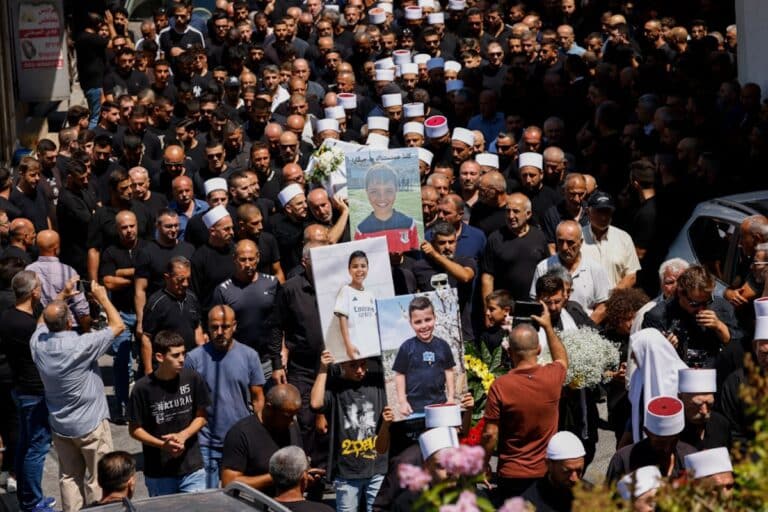
At least 12 children were killed after Hezbollah fired a rocket at a soccer field in the Druze town of Majdal Shams Saturday, the deadliest single attack on Israel since Oct. 7.
The attack sparked fears that the conflict could spiral out of control, with pressure growing within Israel for the IDF to strike Lebanon hard in response.
This has led to the question of whether Israel and Hezbollah are headed to war, as calls to escalate have erupted from both parties.
What happened in Majdal Shams?
On Saturday afternoon, a rocket hit a soccer field in Majdal Shams, a Druze town in the northern Golan Heights. A group of children was playing on the field at the time.
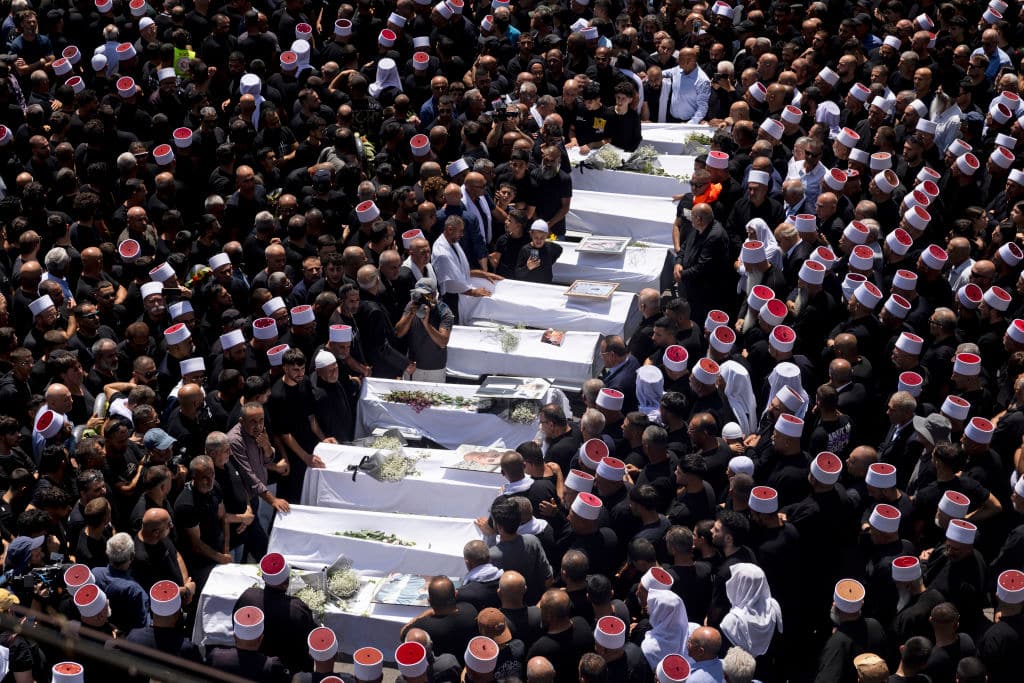
Sirens sounded shortly before the rocket hit, but eyewitnesses said that most people didn’t have enough time to find shelter.
The Lebanese terrorist group Hezbollah first claimed that it had launched a powerful rocket toward the area around the town, but later denied all responsibility for what occurred in Majdal Shams once the extent of the tragedy and the identity of the victims became clear.
No other impacts or interceptions were reported in the area at the time.
The IDF said Sunday that an initial investigation found that Hezbollah fired an Iranian-made rocket from an area slightly northwest of Majdal Shams in southern Lebanon. Israeli officials even named the Hezbollah commander responsible for the rocket fire, Ali Muhammad Yahya.
According to the IDF, no interception was attempted because of the layout of the area and the angle of the launch.
Prime Minister Benjamin Netanyahu, who was conducting an official visit in the U.S. rushed back to Israel after the Hezbollah attack on Majdal Shams to hold discussions about a possible response with the heads of the Israeli military and the security cabinet.
Who are the Druze?
The Druze are a unique religious group that lives mostly in Israel, Lebanon, and Syria.
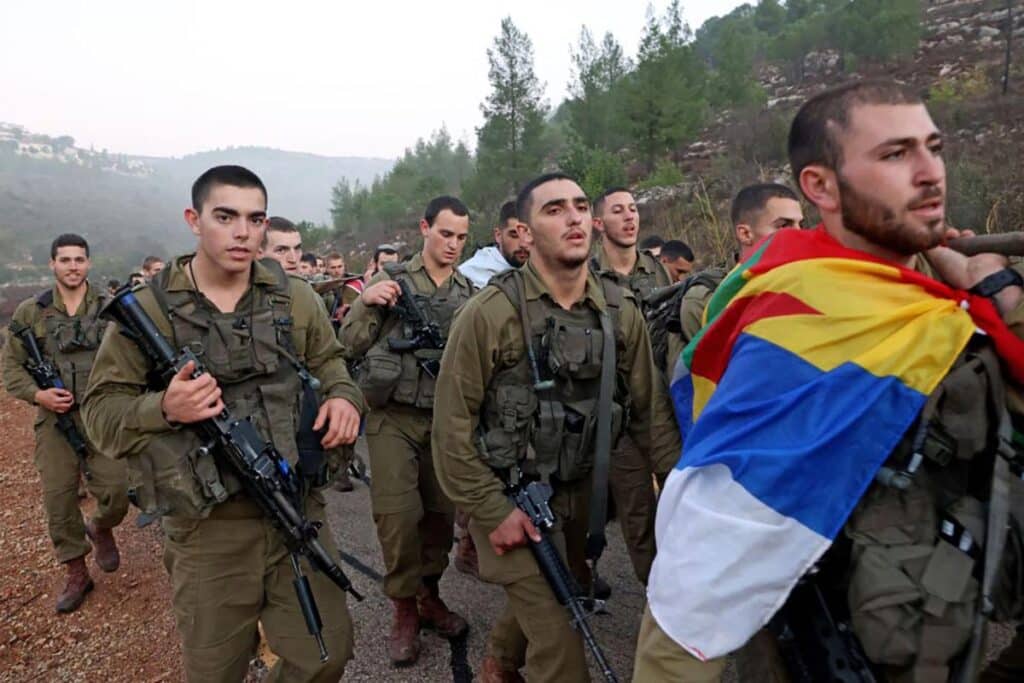
They are known for being strongly loyal to the countries where they live. In Israel, Druze serve in the IDF and the government and, in general, are a central part of society.
The Druze who live in the Golan Heights – which Israel captured from Syria in the Six Day War in 1967 – are different from the Druze who live in other parts of Israel, since most have not accepted Israeli citizenship and still consider themselves Syrian. In recent years, though, more Druze residents of the Golan have applied for Israeli citizenship.
Read more: Meet the Israeli Druze
Pressure grows for a strong strike against Hezbollah
In recent months, as Hezbollah has escalated its attacks against northern Israel, pressure has been growing on the Israeli government and the IDF to respond more forcefully. Residents of the north, who haven’t been allowed home in months, have warned they won’t return until Hezbollah is forced away from the border.
Another factor adding to the pressure is a recent strike by the IDF against the Iran-backed Houthis in Yemen.
Less than two days after the Houthis launched a Kamikaze drone at Tel Aviv, killing one person, Israeli fighter jets struck the port of Al Hodaydah in Yemen in one of the furthest strikes ever conducted by the Israeli Air Force.
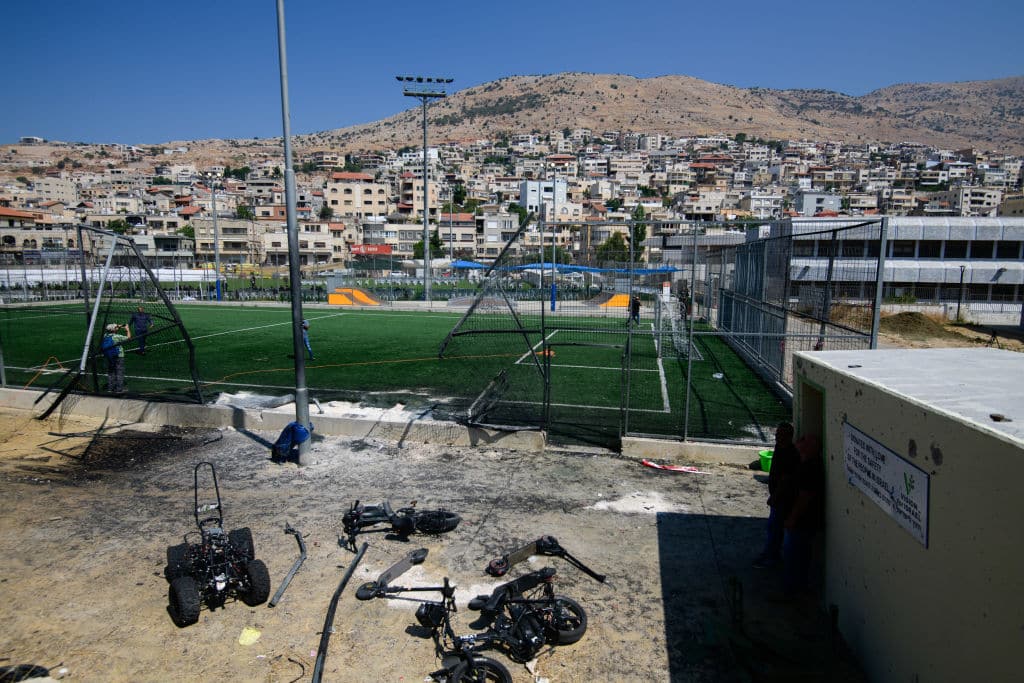
Residents of the north pointed out that they’ve suffered nine months of such attacks from Lebanon, with over 40 people killed, yet without a similar retaliation against Hezbollah.
Many Israelis questioned if the Houthi response showed that the government valued Tel Aviv more than other areas of the country. In previous rounds of fighting with Hamas, strong responses by the IDF usually only came after rockets targeted the center of the country, sparking outrage from communities near the border who suffered from similar attacks on a nearly daily basis.
Amid the horrific scenes from the Hezbollah attack on Majdal Shams, Israeli politicians across the political spectrum and leaders from the Israeli Druze community – issued statements demanding a stronger response than usual to the attack.
Druze residents warn: Respond immediately or else!
Mowafaq Tarif, the head of the Druze community in Israel, stressed that “A civilized state cannot allow continued harm to its citizens and residents to pass. This has been the ongoing reality for the past nine months in the towns of the north. Tonight it crossed every possible red and black line.”
At the funeral of the child victims of the Hezbollah attack on Majdal Shams Sunday, local residents protested against government ministers who showed up: “The children are gone and now you show up? One drone hit Tel Aviv [and] you flipped over Yemen, why is Beirut still there at all? Woe to you if you don’t hit them (Hezbollah) back! For 10 months you’ve abandoned us here!”
A Druze resident who witnessed the attack expressed outrage at Hezbollah and the government on Sunday, saying, “We will remain here! Majdal Shams is ours! The Golan Heights is ours! If you do not know how to defend us, we will know how to defend ourselves! Just like they struck Yemen, they must strike Lebanon and Syria!”
Israeli politicians promise harsh retaliation
Netanyahu warned that Israel would “not let this pass silently,” stressing that “Hezbollah will pay a heavy price for this that it has not paid so far.”
Prime Minister Netanyahu made it clear that Israel will not overlook this murderous attack and that Hezbollah will pay a heavy price which it has not paid up to now.
— Prime Minister of Israel (@IsraeliPM) July 27, 2024
Opposition leader Yair Lapid insisted as well that “The response will be severe and it will reverberate throughout the Middle East. We will not just let it pass.”
The head of the National Unity party Benny Gantz announced that his party would provide “wide support” for “any determined and effective response that will restore security to the citizens of the north.”
Former Labor leader Merav Michaeli called for a “harsh response” to the attack but added that the retaliation should not come at the cost of a possible deal to free the hostages being held by Hamas in Gaza.
Hezbollah warns against retaliation
Meanwhile, Hezbollah warned Israel against carrying out strong strikes in response to the rocket fire.
A cleric close to Hezbollah, Ahmad Qabalan, claimed that “heavy rocket barrages that could flood Tel Aviv and Israeli cities with destruction and fire are ready.”
“Any violation of the combat rules will be met with even harsher retaliation…Any foolish gamble will be met with a crushing response, reaching Israeli cities and infrastructure, easily closing off the Mediterranean and other vital arteries,” the cleric added.
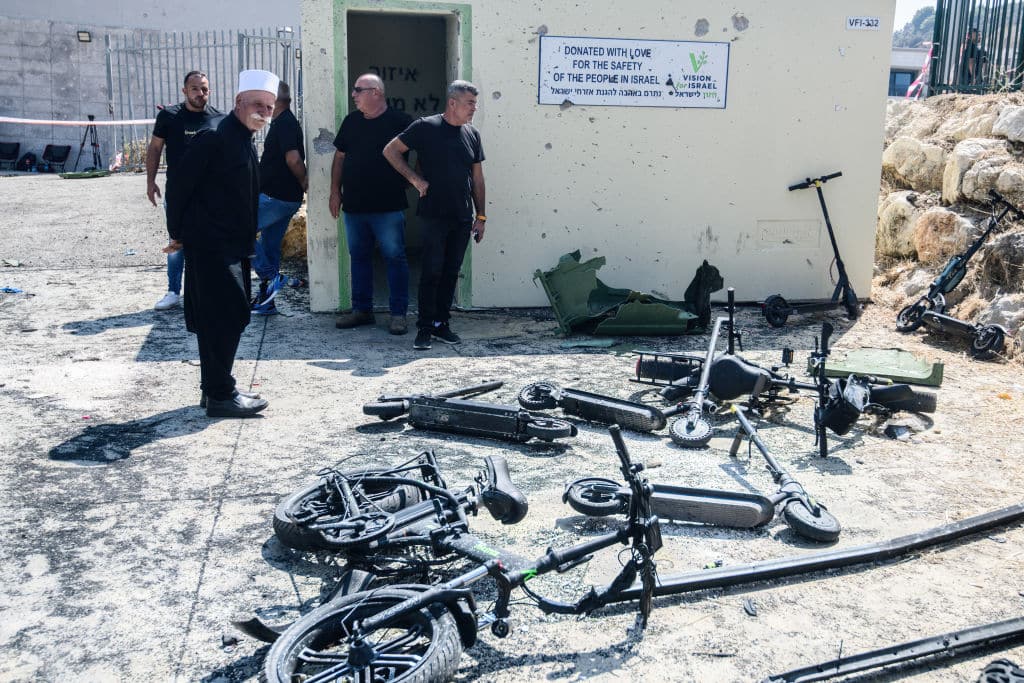
The terrorist organization reportedly went on high alert Sunday, clearing out many central sites in eastern and southern Lebanon in anticipation of an Israeli strike.
Lebanese Foreign Minister Abdallah Bou Habib said Sunday that he had asked Hezbollah to exercise restraint and called on Israel to exercise restraint as well in an effort to avoid a further escalation between the two sides.
“The war will be devastating for everyone, not just Lebanon as some believe,” warned Bou Habib. “Any war on Lebanon will turn into a regional war and Israel will suffer losses. We have had enough destruction in Lebanon, Israel, and Gaza.”
The foreign minister additionally called for an international committee to investigate the source of the attack on Majdal Shams, adding that Lebanon would cooperate with U.N. peacekeeping forces in that regard.
World leaders rush to halt escalation after Hezbollah attack on Majdal Shams
World leaders rushed to contact both Israeli and Lebanese leaders in an attempt to stop the situation from spiraling further out of control.
The United Nations Interim Force in Lebanon (UNIFIL), a peacekeeping force operating along the Israeli-Lebanese border, called on Sunday for all parties to exercise maximum restraint. The force warned that further fighting “would engulf the entire region in a catastrophe beyond belief.”
We urge the parties to exercise maximum restraint & to put a stop to the ongoing intensified exchanges of fire. It could ignite a wider conflagration that would engulf the entire region in a catastrophe beyond belief.
— UNIFIL (@UNIFIL_) July 27, 2024
UNIFIL and @UNSCOL are in contact with both Lebanon & Israel.
U.S. Secretary of State Antony Blinken said that America stands by Israel’s right to defend its citizens from terrorist attacks, adding that the Biden administration is working with Israel to prevent the situation from escalating into a larger war.
Blinken added that the U.S. believes a ceasefire in Gaza would end the fighting between Hezbollah and Israel as well.
France’s Foreign Ministry called for “everything to be done to avoid a new military escalation,” adding that they were working with the two sides to achieve that goal.
Can Israel and Hezbollah avoid a larger war?
Despite the growing pressure for a stronger response against Hezbollah, which could push the situation over the edge, there are still some ways a war could be avoided.
On the one hand, intensive talks are still taking place between Israel, the U.S., Qatar, Egypt, and Hamas aimed at reaching a ceasefire in Gaza. Hezbollah has said that as soon as a ceasefire is reached in Gaza, it will stop attacking from the north.
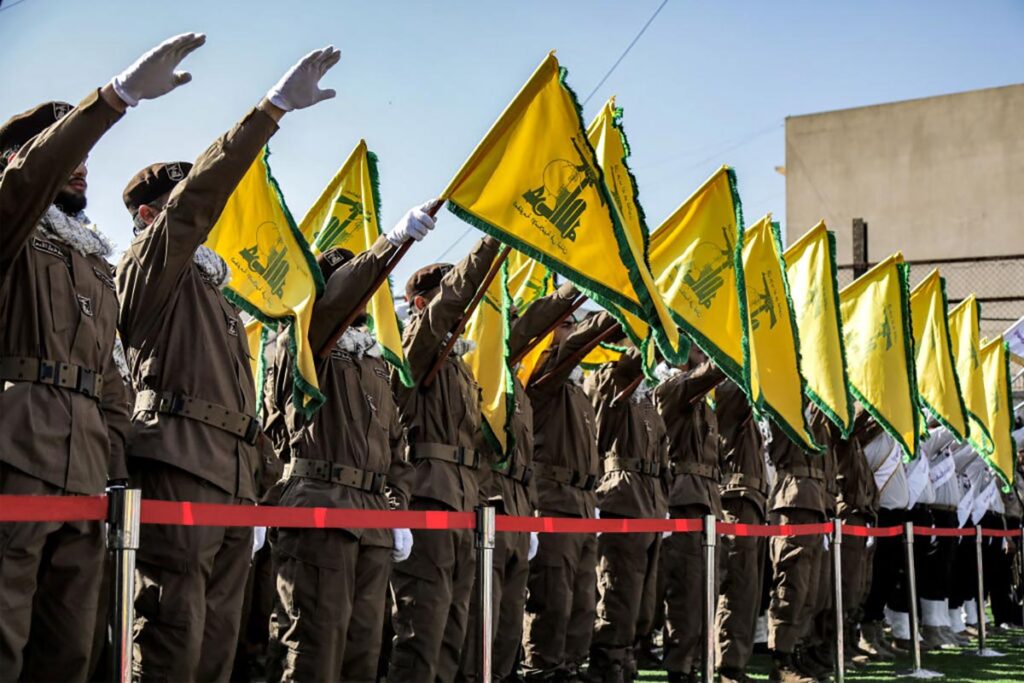
That may not be enough anymore though.
Residents of the north are at a breaking point. They’ve been pushing for a stronger response for months and, after the deadliest single incident since Oct. 7, the rest of the country is up in arms too.
Senior IDF officials also reportedly warned the government that if Israel doesn’t strike Hezbollah imminently, it will lose the advantages it’s gained during the war. The IDF has eliminated hundreds of Hezbollah members and worn out the terrorist group’s weapons supply at least somewhat. Waiting even a few months could allow Hezbollah to rearm and regroup, making future wars more difficult.
On the other hand, the IDF is still fighting Hamas in Gaza and it would be entering a war in Lebanon after nine months of attacks on multiple fronts. That doesn’t even factor in the possibility that Iran-backed militias in Syria, Iraq, and Yemen may get more directly involved if a full-out war breaks out between Israel and Hezbollah.
In future escalations, Hezbollah is expected to launch thousands of rockets daily toward Israel, some of which can reach as far as Eilat. The group also has precision-guided missiles and drones, meaning it can directly and accurately target military bases, power plants, and other critical sites.
While both Israel and Hezbollah are issuing harsh threats and insisting that they are ready for war, both sides are also clearly hesitant to plunge the region into further chaos. It’s important to remember that Israel and the terrorist organization have made similar threats for months already.
At the current moment, the fight between Israel and Hezbollah is only escalating and the two sides appear to be moving closer to the brink of war, but hopes for a diplomatic solution still haven’t been completely abandoned. Which path the two sides will take remains to be seen.
Originally Published Jul 29, 2024 08:37AM EDT
